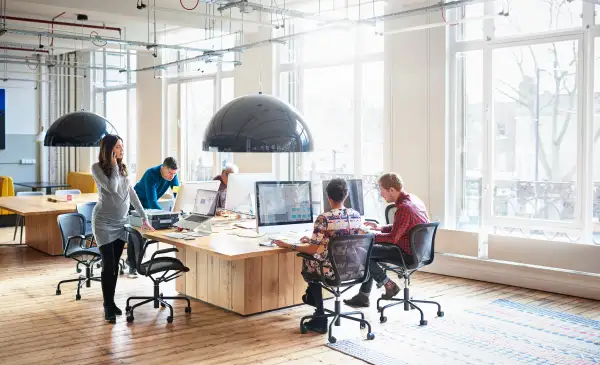Here's What Makes Gen Z and Millennials Happiest in the Workplace

If you’re tired of hearing about how the millennials are changing work for the rest of us, good news: Millennials aren’t the newest game in town anymore.
Get ready to hear (lots) more about Generation Z. They’re just barely on the cusp of adulthood, but their preferences and outlooks are a bit of a throwback to earlier generations. When it comes to workplace habits, instead of wanting to work from their futon or change the world, Gen Zers are happy to plunk their messenger bags down in an office and talk face to face, according to a new global survey from Future Workplace in partnership with Randstad. (The survey was global in scope; below focuses on U.S. workers.)
Two years ago, when most American Gen Zers (defined as survey respondents who are 22 years old now) were still in school, they were distinctly cool to the idea of spending adulthood in an office, but that’s changed quite a bit. Millennial preferences also shifted, but in the opposite direction — which could give the youngest crop of workers an advantage when vying for jobs in more traditional workplaces that value employee face time.
In 2014, just 16% of Gen Z members said that working in an office would be their employment preference. Just two years later, that has jumped by a full 20 percentage points to 36%. Meanwhile, the number of millennials (those aged 23 to 34) who said that a corporate office was their preferred workspace fell by 10 percentage points, to 37%.
Read Next: Here’s the Easiest Way for Millennials to Become Millionaires
The appeal of co-working spaces appears to be on the wane among both demographic groups, with smaller numbers of both Generations Y and Z expressing a preference for this kind of traditional work arrangement. Although the number of millennials who prefer a home office nearly doubled between 2014 and this year, the appeal among Gen Z members was nearly flat.
Those preferences might be informed by how each group prefers to communicate, and what kind of workplace interaction they value most. Although both age groups say that the work itself is the top inspiration for their creativity, both credit their colleagues as a close second.
The two groups diverge when it comes to social networks, though. Both Generations Y and Z gravitate towards Facebook the most, but it’s more popular with millennials. Gen Z shows a slight preference for Twitter, YouTube, Instagram and Reddit, and they’re somewhat more likely than their older co-workers to blame social media for distracting them during the workday. Gen Y’s social network preferences tend a bit more towards LinkedIn and Pinterest. While millennials also flag social networking as their top at-work distraction, they’re also five percentage points likelier than Gen Z to blame email for their broken concentration.
Despite the lure of social media to break up the monotony of their jobs, the favorite mode of communication for both groups is in-person. Gen Y is more comfortable with email and phone correspondence than their younger counterparts, though. When it comes to communicating with their bosses, both groups are in agreement that in-person is the way to go to an even greater degree.
Read Next: Millennials Want Peace and Quiet at Work, Not Free Snacks
Young adult workers might buck the expectation that they prefer texting to talking, but millennials do hold up one stereotype: They crave hand-holding in the workplace. In 2014, 47% of millennials said they wanted to be mentored by their bosses, a figure that actually crept up by one percentage point in this year’s survey, even though these workers have two more years of work experience under their belts, and many are even becoming managers themselves. Gen Z, on the other hand, is spreading its wings much more quickly. In 2014, 69% said they wanted mentoring; this year, that’s fallen a significant 20 percentage points to 49%, putting them nearly on par with their older colleagues.
Although they do appreciate — and expect — more flexibility than older generations of workers, “Millennials and Gen Z value the in-person communication that comes with a traditional corporate office much like older generations do,” Dan Schawbel, Future Workplace’s research director, said in a statement.
